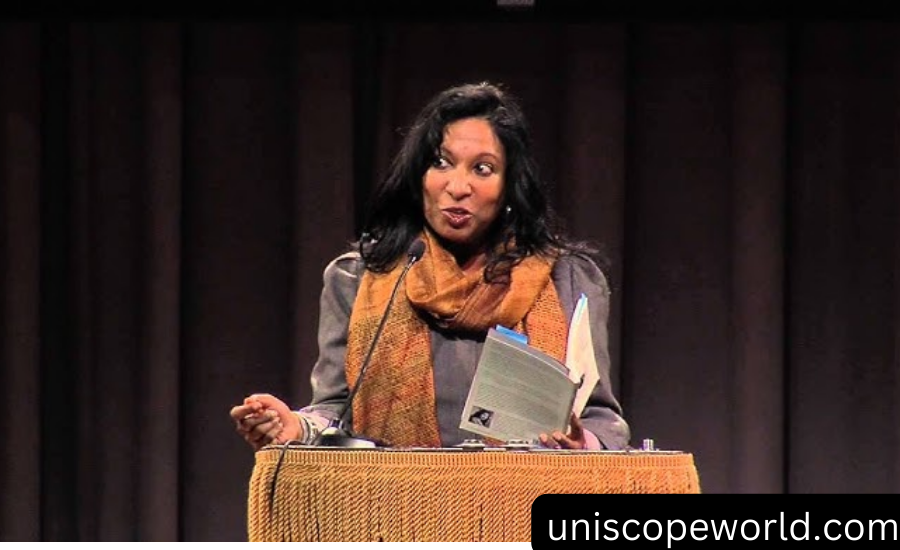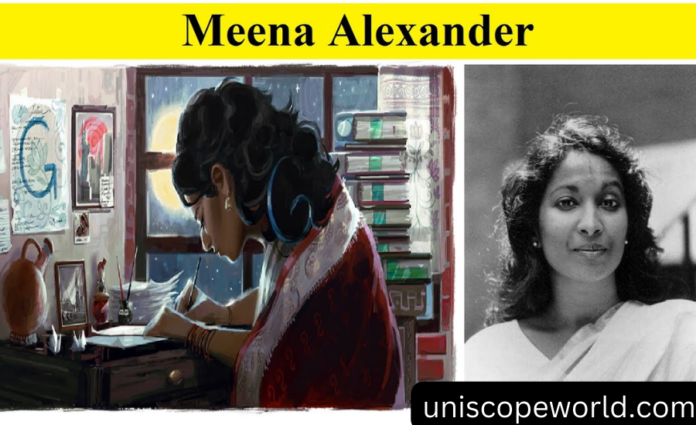Meena Alexander was a trailblazing poet and scholar whose writings from three continents showcased her varied and deep cultural upbringing. Her poems provided unique insights into the human experience of mobility and separation by delving deeply into topics of identity, displacement, and the pursuit of belonging. Alexander developed a distinctive style that spoke to people juggling the demands of several cultural identities by fusing the traditions of Indian and Western literature.
Alexander shed light on the emotional terrain of migration and its effects on a person’s sense of self through her poignant and reflective poetry. She captured the beauty and the sadness of relocation as she creatively examined how geography, culture, and legacy affect a person’s identity. Her writings not only spoke to people who have faced the difficulties of juggling many cultures, but they also provided a global perspective on the fundamental human yearning to fit in.
In addition to her achievements as a poet, Alexander was a dedicated activist and researcher. She combined her knowledge of literature with a strong sense of duty to confront societal challenges, using her voice to promote social justice and support underrepresented groups. Her literary and activist efforts have endured, serving as an inspiration to upcoming generations of authors, academics, and activists. Meena Alexander’s legacy lives on today as a manual for comprehending the intricate relationships between culture, identity, and the ability of language to influence and change the world.
Meena Alexander: Life, Poetry, and Lasting Impact
Meena Alexander’s thorough examination of identity, culture, and the difficulties of migration can be found in Meena Alexander’s life and work. Her early experiences of relocating across continents have influenced her lyrical voice and personal journey. She was born on December 17, 1951, in Allahabad, India. Alexander’s geographic moves throughout her life had a significant impact on her work and gave her a distinct viewpoint on subjects like self-discovery, belonging, and displacement. This essay will examine how these events are reflected in her poetry and how her writing influenced modern literature. It will also showcase important works and talk about the authors and academics who recognized her influence on the literary world.
Meena Alexander’s life was characterized by many movements from an early age. When she was just five years old, her family moved from Khartoum, Sudan, exposing her to a variety of cultural influences that would have a significant impact on who she was. Being raised in diverse cultural contexts, Alexander’s poetry eventually came to represent the conflict between familiarity and unfamiliarity, as well as between exile and belonging—two major themes that ran throughout her body of work. Her poems started to capture the universal human experience of adjusting to new surroundings while clinging to one’s heritage as she traversed these intricate cultural intersections.
Early Life and Academic Journey
Meena Alexander’s growth as a poet and scholar was greatly impacted by her scholastic background. She was raised in Sudan, Kerala, and India before relocating to England to pursue her further studies. She honed her analytical abilities and expanded her knowledge of literary traditions while completing her Ph.D. Alexander’s varied cultural experiences and academic background enabled her to contribute a distinct viewpoint to her work. Her schooling, which combined formal education with real experiences in various places, greatly influenced how she explored important issues in her poems, like identity, migration, and the human yearning for belonging. These subjects became the main focus of her work, providing readers with a deep and complex understanding of the human experience.
The Impact and Recognition of Her Work
Meena Alexander’s The international literary community has been profoundly and permanently impacted by Meena Alexander’s literary legacy. Admired for her unique style in modern poetry, she deftly blends intimate experiences with universal cultural themes to provide a compelling and reflective analysis of migration, identity, and the quest for belonging.
Readers have been deeply moved by her moving examination of identity, particularly as it pertains to women negotiating challenging cultural environments. Alexander writes poetry that feels both personal and universal thanks to her rich imagery and emotional resonance, which enables readers to recognize themselves mirrored in her writing.
Alexander is regarded as one of the greatest poets of her generation because of her enormous literary accomplishments, which have garnered her critical recognition and multiple honors. In addition to receiving scholarly acclaim, her poetry has moved the hearts of innumerable people who can relate to her depiction of identity exploration and relocation.
The enduring importance of Alexander’s poetry is highlighted by the thriving scholarly interest in it. Her writings offer a forum for significant discussions on current social topics that are still at the forefront of international debates today, such as feminism, migration, and memory.
Meena Alexander’s Poetry: A Fusion of Cultures and Emotions
Meena Alexander’s poetry speaks to people all over the world because it explores common topics in a way that is both incredibly personal and approachable. She skillfully incorporates themes of longing, displacement, and the quest for self-discovery into each of her poems, making them central to her work. Alexander’s poetry crosses cultural borders by fusing Indian and Western literary traditions in a way that is both expressive and globally relevant.

The Poetics of Dislocation
A recurrent theme throughout her work, Alexander examines the psychological and physical effects of displacement in The Poetics of Dislocation. Her writing explores the sensation of being “rootless” while simultaneously using the written word to find a sense of identity and home. These pieces encourage readers to consider how identity is malleable and how we create a sense of place in a world that is changing all the time.
Meena Alexander connected the ancient and the modern, the East and the West, by fusing a wide variety of languages and imagery over the course of her work. Her lyrical and experimental style produced poetry that not only enthralled readers but also prompted them to consider the more general issues of memory, migration, and humanity’s common experiences.
Meena Alexander’s Legacy and Her Impact on Modern Literature
Beyond just her poetry, Meena Alexander has had a huge influence on contemporary writing by helping to elevate perspectives that have traditionally been marginalized in popular literary circles. She is a key figure for people navigating these difficult situations because of the profound resonance of her writing with authors who examine identity, displacement, and the intricate junction of cultures.
Many modern poets consider Alexander to be an influence, and she is especially respected for her skill at fusing political and personal elements in her writing. She was able to compose stories that connect with readers and inspire aspiring authors to embrace their own experiences and viewpoints because to her skillful lyrical writing.
Alexander’s writing was enhanced by her international perspective as an immigrant, giving her a distinctive voice in world literature. She contributed to continuing discussions on identity, community, and the intricacies of cultural belonging by examining the theme of belonging in ways that shed light on the experience of immigrants. Her writings still act as a spark for intercultural discussion and provide a forum for a range of viewpoints in the contemporary literary community.
Meena Alexander’s Poems: A Window into the Human Soul
Many people praise Meena Alexander’s poetry for its deep emotional resonance and examination of difficult subjects like migration, identity, and displacement. Intimate, personal stories are frequently combined with more general cultural and societal views in her work, which skillfully blends the personal and the political. Alexander explores the complex relationships of home, belonging, and the quest for identity in the face of perpetual migration through her literary voice. Her poems offer readers a view into the emotional landscapes produced by migration and the negotiating of identity across boundaries, making them more than merely literary masterpieces.
Alexander skillfully weaves tales that touch on the core of the human experience in her most well-known poems, from loss and sadness to the subdued victories of self-discovery. She has made a name for herself in modern poetry thanks to her striking narrative style, lyrical grace, and vivid imagery. Her writings, which are full with Eastern and Western cultural quirks, shed light on her own path as well as the general difficulties of balancing one’s past with present-day obligations. Her legacy offers timeless insights on what it means to belong in a world growing more interconnected by the day, inspiring writers and readers alike.
My Mother’s Story
“My Mother’s Story” is a deeply poignant poem by Meena Alexander, where she blends personal memory with universal themes of heritage, family, and the passage of time. In this piece, Alexander pays tribute to the strength and resilience of matrilineal figures, recognizing the profound influence mothers and grandmothers have in shaping our identities and our lives.
The poem reflects on the enduring nature of familial bonds and the weight carried by each generation. It portrays a mother’s journey not as a single narrative, but as an ongoing story that is passed down, ever evolving, like the unfolding petals of a flower. The delicate yet unyielding nature of these generational stories speaks to the deep, almost invisible threads that tie us to our past, offering both comfort and continuity.
Excerpt: “My mother’s story is woven into the very fabric of our country,
Each thread bearing the weight of an entire generation’s history.
A tale that will never truly end,
Yet, it blossoms like the gentle unfolding of petals—
Soft, yet enduring.”
Through this work, Alexander invites readers to reflect on the role of women in preserving cultural memory and nurturing the legacy that defines us. The poem reminds us that, though time passes, the essence of our ancestors remains alive, growing, and unfolding in each new chapter.
House of Love
The idea of a house is used to emphasize how imperfect love is, even though it is a place of safety. Even the most safe and personal relationships can have flaws, which are symbolized by the home’s structural fissures. The idea that love, although it can bring comfort, also exposes us to the uncertainties and emotional turmoil of the world is reflected in the open doors, which are always embracing the unpredictable forces of life, symbolized by the wind.
Excerpt: “Words are the foundation of the home of love, yet even they have their flaws.
The doors are constantly open, welcoming the winds of uncertainty, even yet it serves as a haven.
The delicate balancing act between comfort and vulnerability that characterizes love is captured in this poetry. It serves as a reminder that although love can provide warmth and safety, it also entails vulnerability and unpredictability. Alexander urges readers to accept the complexity of love as a necessary component of the human experience in this contemplation.
A Prayer for My Mother
Meena Alexander, in “A Prayer for My Mother,” reflects deeply on the spiritual and emotional connection she has with her mother. By fusing the sacred with the everyday, this poem examines the complexities of the mother-child bond and conveys a desire for fortitude and resiliency in the face of adversity.
Alexander encapsulates the enduring bond between a mother and her kid in these remarks. The plea for her mother’s enduring strength expresses a want for that love and guidance to endure beyond time, while the image of leaves floating in the wind represents the fleeting aspect of existence. The concept of an enduring spiritual connection that endures beyond physical proximity is exquisitely captured in the poem.

‘The Heart of the Illiterate’
In one of her most well-known poems from The Illiterate Heart, Meena Alexander explores the profound themes of yearning, love, and the unsaid words that remain embedded within the heart. The poem delves into the complexity of communication, particularly in relationships, highlighting how some emotions are difficult to articulate fully. Alexander’s work reflects on the silence that often accompanies love, capturing the tension between what is felt and what can be expressed.
Excerpt: “A heart that doesn’t know how to read,
How can it tell the tale of love?
Words flow out like water,”
This poignant reflection invites readers to consider the limitations of language and the deep, often unspoken feelings that bind people together. Alexander’s imagery suggests that while words may fail to completely convey the depth of love, the emotions that reside within the heart are no less real or powerful. Through this exploration, the poet offers a profound commentary on the intricacies of human connection and the silent language of love.
The Memory of Water
Meena Alexander makes a strong analogy between water and memory in this moving poem, emphasizing how both are fluid and subject to change. She considers how memories and water are both ever-changing, constantly moving through time and influencing the present. Alexander uses vivid language to illustrate how the past influences the present, much like a river that carries the echoes of the past with it.
Excerpt: “Rememberings are carried by water,
A river that meanders through time, carrying the aroma of long-forgotten locations,
faces of people who are long dead, their sadness and laughter still pulsing deep within them.
You May Also Like: Martie Allen
What Was the Cause of Meena Alexander’s Death?
After a valiant and quiet fight with ovarian cancer, Meena Alexander, a renowned poet, researcher, and supporter of underrepresented voices, died on November 21, 2018, at the age of 66. She continued to be committed to her work despite her sickness, making a substantial contribution to the academic and literary worlds. Even though she passed away, a chapter in feminist and postcolonial literature came to an end, but her influence and inspiration endure.
Despite her health issues, Alexander’s love for teaching and writing remained unwavering as a writer and educator. Powerful themes of identity, migration, displacement, and resilience were explored in her poetry and academic writing. Her own life experience and the difficulties faced by individuals traversing various cultural norms were represented in these topics, which were very personal yet generally applicable.
Meena Alexander remained steadfast in her dedication to her art even in her last days. Her writings are still relevant today, providing readers everywhere with direction and comfort. She is an enduring voice for those whose stories are frequently ignored because of the clarity and insight her work offers into the difficulties of cultural identification and belonging.
Even though Meena Alexander is no longer with us physically, her poems and scholarly accomplishments continue to have an impact. Future generations will continue to be inspired and guided by her work, guaranteeing her reputation as a literary pioneer and a strong voice for the voiceless. The words she left behind will always reverberate with her voice and vision.
Conclusion
The poetry and life of Meena Alexander serve as a tribute to the timeless value of language and narrative. Readers from a wide range of ethnic origins have found resonance in her work, which immerses them in a universe influenced by themes of memory, identity, and migration. Alexander explored the intricacies of the human condition in her poetry, providing profoundly intimate yet broadly applicable insights.
Alexander’s distinctive storytelling style, which combines her personal background with more general societal topics, sets her work apart. She skillfully discusses the struggles and victories that many people encounter in today’s globalized society. Her poetry speaks to both personal hardships and universal human experiences because of her ability to portray unfiltered emotions and nuanced details.
The influence of Meena Alexander went well beyond her own works. She encouraged many poets and writers to accept their varied identities and incorporate them into their work by serving as a mentor and role model. Her contributions sparked a deeper investigation of issues that are still crucial to discussions of modern literature, such as identity, belonging, and cultural interaction.
Alexander showed incredible fortitude throughout her life, overcoming personal adversity and producing works that have had a long-lasting influence on the literary community. Her legacy as a significant literary character and poet continues to inspire people. Future generations will continue to find resonance in Meena Alexander’s voice, which encourages readers to delve into the intricate stories of identity, belonging, and self-expression.

